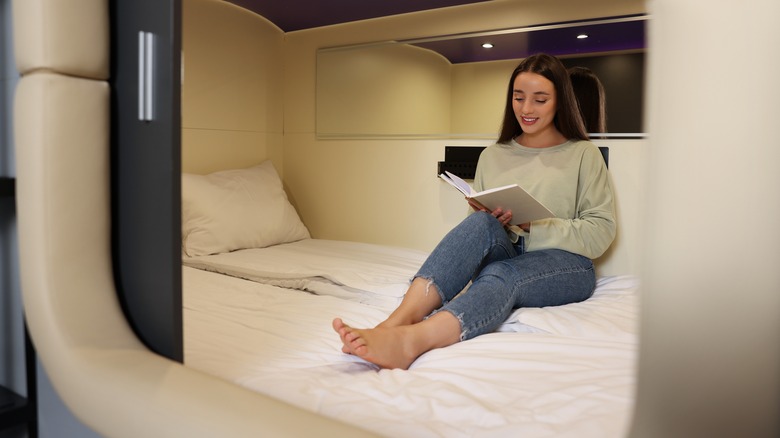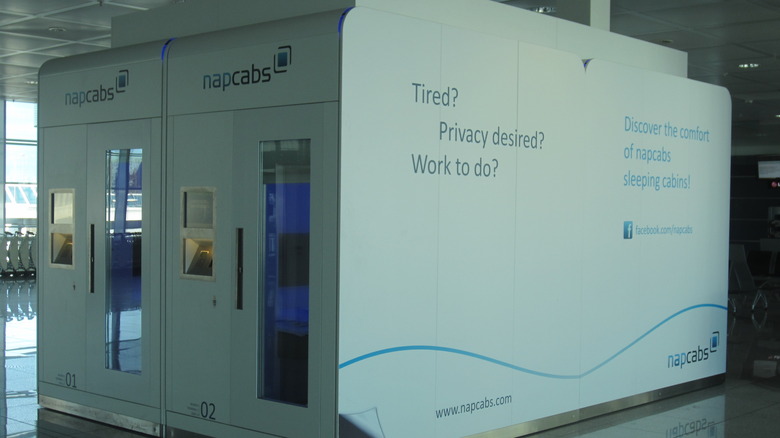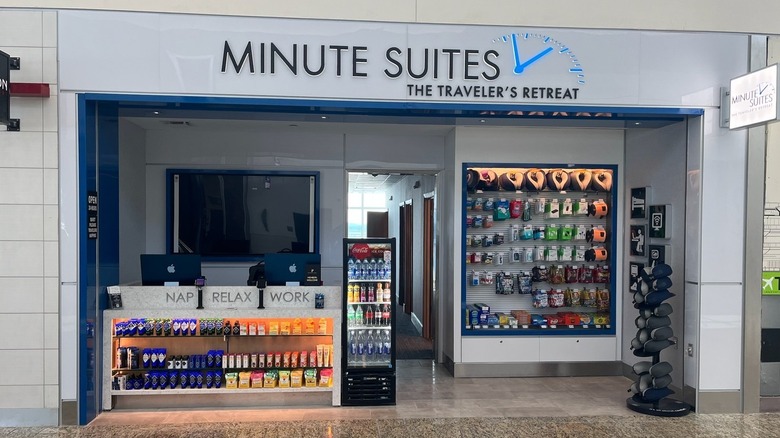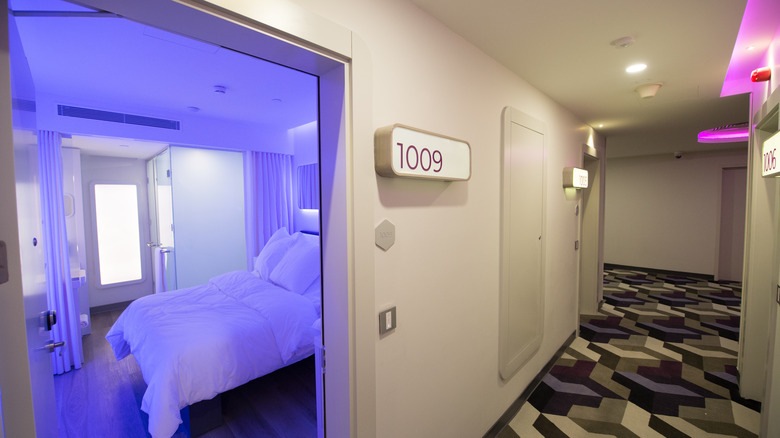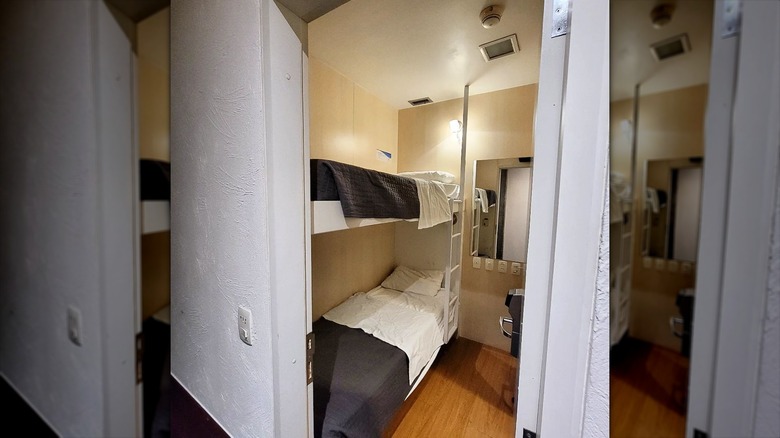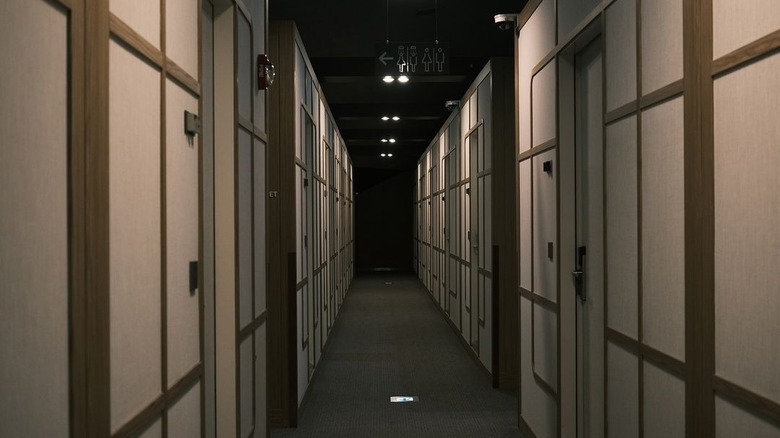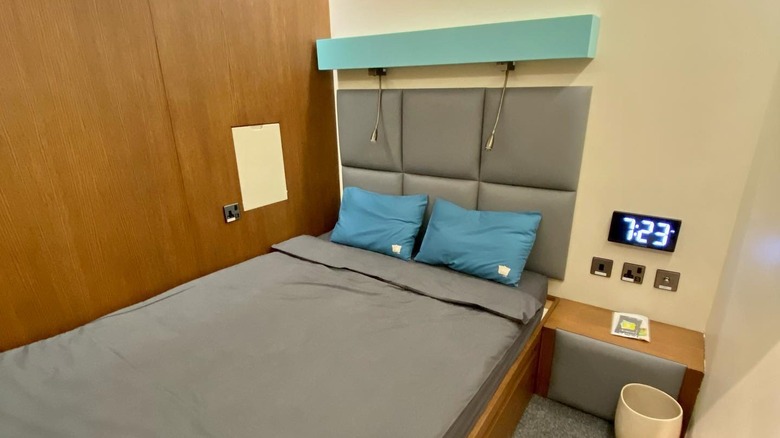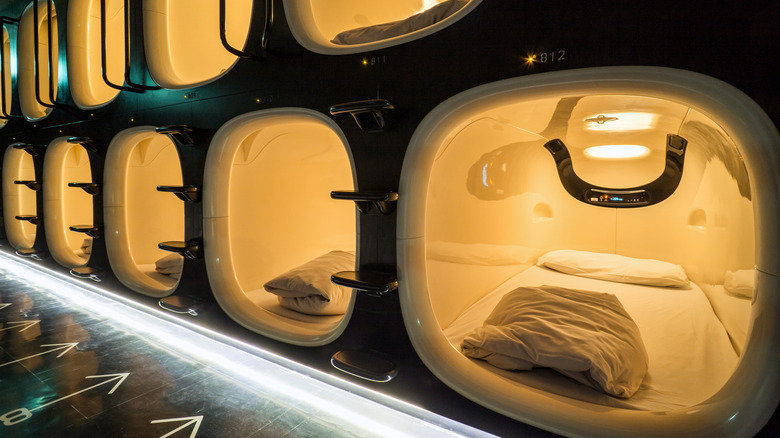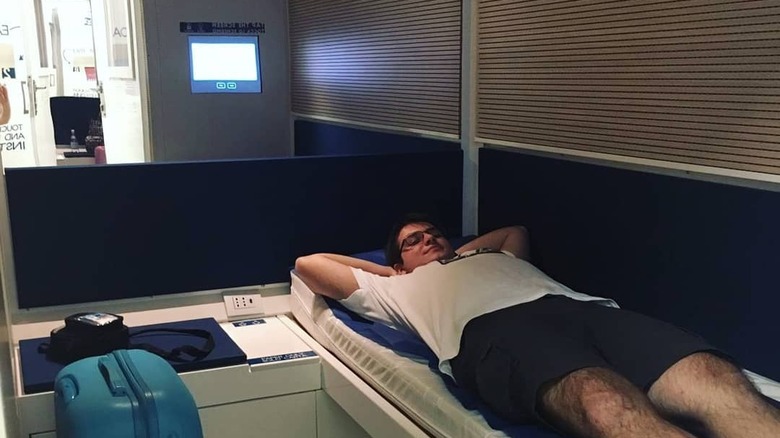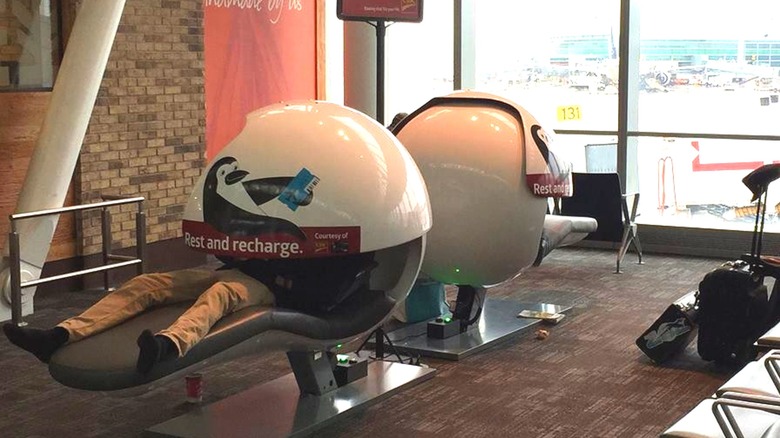Airports Around The World With Sleep Pods
Spending half a day or more sitting around an airport terminal because of a canceled flight or a long layover can sap the joy out of travel, especially when you are jet-setting across the world. According to the Bureau of Transportation Statistics, 20.5% of all domestic flights in the U.S. were delayed in 2022. That's a lot of sitting around in crowded gates. You could leave the airport during a long layover and strike out into the city, but that can be a risky undertaking.
That's one reason sleep pods — also known as energy pods, sleeping cabins, and nap pods — have been growing in popularity. The self-contained pods are designed for a guest to sleep anywhere from a half hour to overnight. At airports, they have the advantage of giving travelers a quiet place to stretch out, get some sleep, and protect their luggage.
There are many different brands of sleep pods, each with its own amenities, filling airports around the world. SkyQuest Technology reports that the global sleep pod market grew from $1.83 billion in 2021 to $2.02 billion in 2022 and is poised to grow to $4.49 billion by 2030. Here's a look at some of the major brands scattered throughout big flight hubs.
German cabs offer private spaces
For those stuck in the Munich, Germany airport, NapCabs offers a respite for people seeking either a nap or a quiet place to work. Found at four different gates in Terminal 2, the pods offer comfortable privacy. In addition to a bed, there is a work desk and free internet access (that's not shared airport wi-fi). But the comfort goes beyond the basics. A 19-inch multimedia touch screen lets you choose between music and mood sounds to help you get your best sleep. You can also adjust the lighting and air ventilation to accommodate your preferences and create the most relaxing environment possible. There is a coat hook for your wardrobe and room under the bed for your carry-on luggage.
Prices vary based on the time of day: It is 17 euros (about $18.53 USD) per hour between 6 a.m. and 10 p.m. and 12 euros (about $13.08 USD) during evening hours. There is always a 2-hour stay minimum and you pay at the terminal outside of the cab. NapCabs recently announced that they have installed sleep pods in both the Berlin and Frankfurt airports as well. Frankfurt cabs are inside the security area of Terminal 2 and the Berlin cabs are in the public area of Terminal 1.
One Miracle Night in Bangkok
The sleep pods in Bangkok, Thailand offer a more immersive experience, one Sleepbox by Miracle defines as a "stylish and chic hostel" for guests at the Don Muang International Airport. Built on the fourth floor of Terminal 2, the mini-hostel offers 55 contemporary rooms, each with its own bathroom (complete with a towel warmer for a taste of luxury). The pods include a double bed, air-conditioning, a flat-screen TV, and free Wi-Fi. Decorated in black and white, the 20-meter square rooms are available for two-person occupancy.
Each guest checks in at a front desk which is adjacent to a lounge and coffee bar. In one review on the Sleepbox website, a German traveler wrote, "Rooms are comfortable and equipped with all you need while waiting for your flight. Totally recommended!" Rooms can be reserved online for one, three, or 10 hours. A 10-hour stay costs 3,000 Thai bhat (about $85.30 USD) — and for an extra 300 Thai bhat (about $8.53 USD), you can have a half-hour access to a shower. For a one-hour stay, the cost is 500 Thai bhat (about $14.24 USD). All prices are with taxes included.
Giving travelers a place to retreat
Minute Suites provides people traveling across the U.S. a place to retreat from the bustle of an airport terminal, whether they want to sleep or take advantage of an office space. Found in Atlanta, Nashville, Baltimore, Dallas/Fort Worth, Detroit, Charlotte/Douglas, Houston, New York City's JFK, Newark, and Salt Lake City, the company offers several different types of suites to accommodate the varied needs travelers have. For instance, at JFK they offer snacks, drinks, and travel essentials. The Charlotte airport offers a variety of suites from the smaller Uptown or Speedway suites, with a daybed only, to the larger First in Flight, Carolina, Panther, or Queen City Suites that can accommodate up to four travelers and have a daybed with a trundle. Some locations have showers or spacious bathrooms while others do not.
Suites come equipped with a daybed, work desk, television, white noise machine, and small refrigerator. Suites can be rented for $48 for one hour (at minimum) with $12 charged for each additional 15-minute increment. Extended 8-hour stays after 9 p.m. are $175. A 30-minute shower can be rented for $30 or $20 with a suite rental purchase. Airline crew and military are offered walkup discounts.
Amsterdam travelers get all the necessities
According to YotelAir's slogan, the company provides travelers with "everything you need and nothing you don't." They pursue this at the Amsterdam airport with three different styles of suites: Standard, Premium Queen, and Family. The suits start at just 2 meters wide (for the standard room) to 22 square meters (for the family). They also have cabins exclusively for showering with rain showers and Urban Jungle amenities. Their signature amenity is the bed — a fully adjustable smart bed that can be either an upright couch or a fully flat double bed. Pull-out desks give travelers space to work.
Located just past security and check-in in Lounge 2 at the Amsterdam airport, YotelAir has dubbed their check-in/check-out center "mission control," with a crew available to help fetch emergency supplies, snacks, toiletries, or answer questions. Cabin rental rates are for a minimum of four hours and a maximum of 8. Four-hour rentals start at 95/110/125 euros (about$103/$119/$136 USD) with each additional hour being 10 euros ($10.90 USD)
Catch some Fast Sleep in Brazil
Travelers touching down in Sao Paulo, Brazil will find Fast Sleep Suites by Slaviero Hotels ready to offer them a place to nap, sleep overnight, or even just take a shower — the key to surviving long layovers Focused on practical comfort, the mini-hotel inside Guarulhos International Airport offers bunk and double-bed cabins and suites, ranging from 4 to 7 square meters. They all come with central air conditioning, wi-fi access, baby bathtubs, and handicap accessibility. Some have en-suite bathrooms while others offer guests access to external bathrooms. One reviewer — a recent traveler who stayed there because he and his wife had a 16-hour layover — said it was very clean, "We were able to sleep well and take a shower in our own bathroom." Other reviewers recommended bringing earplugs because the walls are thin.
Located in Terminal 2 East on the ground floor, the bilingual staff is available to support guests, though reservations must be made via their website. Rates start at $648 Brazilian real (about $132 USD) for an overnight stay. Hourly rates are available by calling the mini-hotel directly at +55 (11) 2445-2356.
Snooze at Korea's first capsule hotel
South Korea's first capsule hotel, DARAKHYU, opened at the Incheon International Airport in Terminal 2. Their rooms provide a comfortable bed with a Simmons mattress and a table on which to charge all of one's devices. The hotel has a lobby that they invite guests to use as a living room, a place to socialize, or an office to conduct business with printers, copiers, and scanners. While some rooms have showers in the suites, there are 10 shower rooms that any guest can use for no additional charge and are filled with soap, shampoo, towels, and a hair dryer. High-tech options allow for keyless entry and the ability to control the room's Bluetooth speakers, lighting, and access from an app.
It's a place popular with visitors: After 390 reviews on TripAdvisor, it had a 5.0 out of 5 rating and is ranked as the #3 hotel among 184 in Incheon. One guest said, "It's also not too expensive, but feels expensive." The expense ranges from 23,100 Korean won (about $18 USD) to 36,000 KRW (about $28 USD) for a three-hour stay and up to 55,000 KRW (about $42 USD) to 75,000 KRW (about $58 USD) for a 12-hour stay.
Plenty of options to Sleep N Fly
Sleep N Fly at the Doha airport (a destination in and of itself) strives to meet the needs of travelers who have to tarry at the terminal with a variety of pod options. With locations in multiple terminals and gates, there are eight different types of sleep lounges which range from private pods to cabins. They come with names like Igloo Pod and Yawn Family Cabin.
A hybrid between the traditional airport lounge and a hotel, Sleep N Fly has a hospitality and housekeeping team on the job 24/7. They offer personalized wake-up calls and sell sleep-related products. Their upgraded FlexiSuites were launched in 2020 with a flat bed that has individually controlled back and footrests, a reading light, and a folding table. Their double cabins are four square meters and include a double bed with colorful pillowcases and luxurious bed linens, reading lights, a bedside table, and a fold-down table.
Prices range from $30 an hour for a power-nap therapy pod to $123 for two hours in the Yawn Family cabin which accommodates four adults and two children. Lounge Lite and Business Pods offer small areas for guests to either relax or work. The Lounge Lite pods are $29 for two hours and offer unlimited coffee, soft drinks, and water in a semi-private alcove. Business Pods have a folding desk, multiple charging options, and a comfortable couch-like seat for $43 for two hours. You can take a 30-minute rain shower for $20 if you are a reserved guest or $25 if you're a walk-in.
Stay in one of Japan's hottest sleep spots
An extension of a trendy Japanese hotel chain, 9 Hours is the only hotel inside the Narita International Airport. Located in the first-floor basement of Multistory Car Park P-2 and connected to Terminal 2, it can be used for showering or sleeping. Segregated by gender, the hallway of sleeping pods has an almost sci-fi feel to it with a long row of twin-bed-sized sleeping capsules two stories high. Each guest checking in is given access to communal bathrooms, shower stalls, and individual lockers. Upon arrival, each guest is also given a bag with sleepwear, a toothbrush, slippers, and two towels.
The sleeping pods are unavailable between 10 a.m. and 2 p.m. so that they can be cleaned, though guests can leave their belongings in the lockers during this time. Rates start at $1,500 yen (about $10 USD) for the first hour and an additional 500 yen (about $3.34 USD) for each hour after that. Showers are available 24 hours a day and can be rented for a maximum of one hour for 1,000 yen (about $6.69 USD). Included in the cost are towels, shampoo, conditioner, and soap.
Escape for some Zs at Vienna's airport
If you want to catch some Z's during a long layover in Vienna-Schwechat, there's a bed waiting for you on the second floor of Terminal 3. ZZZleepandgo has 16 cabins on the public side before security. The Italian company got its start in 2015 as a project by three university students. Each high-tech cabin comes with a single bed, fold-up desk, and small seat. The multi-media system controls the room lighting, curtains, and ventilation, and streams music or movies. It is equipped with color therapy and an alarm that syncs with boarding times.
What it doesn't have is a pillow or blanket, so you'll want to bring your own, though reviewers say the pods and beds are quite warm. When you open the cabin, you'll witness an automatic system change the sheets and hear the blowing of a sanitizing air ionization system. Bathrooms are nearby and guests can leave their luggage in the cabin, but they must return within 15 minutes or have their luggage reinspected by security.
ZZZleepandgo is one of the few services that, after the first hour, pro-rates stays by the minute. Rental rates are 9 euros (approx. $9.83 USD) per hour with discounts available on the website. You'll want to be sure to hit the "check-out" button on the touchscreen and enter your mobile number when you leave or your card will be charged for the full pre-authorization amount of 70 euros (approx. $76.42 USD). In 2022, the company expanded to 16 different airports in nine countries.
Toronto offers free sleep options
In the summer of 2022, Toronto's Pearson Airport was so plagued by delays that they were designated the worst airport in the world for on-time flight departures. It was so bad that Air Canada was handing out yoga mats for people to sleep on (and remains one of the most stressful in North America). But the airport now has more attractive options for catching some sleep if you get stuck in the airport. There is a designated rest zone in Terminal 1 and free sleep pods and Muskoka chairs spread throughout the airport. ln the Terminal 1 Departures Hall, there are energy pods, a way to catch a quick snooze on a lounge bed with a capsule that lowers over your head. You'll need someone to watch your luggage while you nap. Pearson is also known for having plenty of benches with no armrests to lie on.
If you're willing to pay a fee, there are premium lounges where you can sleep on their loungers. Travelers do warn that the airport can get cold and noisy, so bring a blanket and earplugs.
